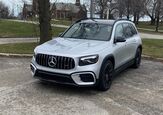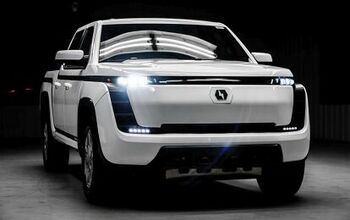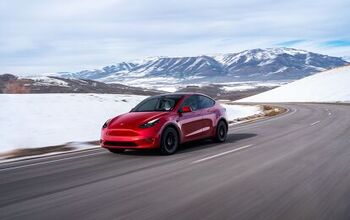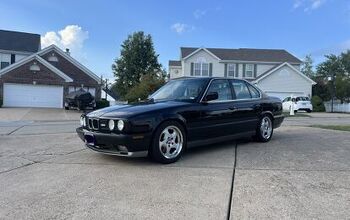Senate Fumbles With Self-driving Legislation

Bipartisan legislation to “promote the safe development of autonomous vehicles” is currently being held up by a trio of Democrats, according to U.S. Senate Commerce Committee Chairman John Thune. While much of Congress is hoping to push the AV START Act through, Sen. Dianne Feinstein and two colleagues have blocked unanimous consent — stalling the bill’s swift progress by forcing a floor vote.
Thune, who sponsors Senate Bill 1,885, told reporters he hoped Feinstein and the other Democrats would see the light. “We could save a lot of lives,” Thune said, adding that 94 percent of car crashes are caused by human error. “It is cutting-edge technology, transformational in terms of the economy.”
However, the opposition isn’t convinced autonomous vehicles are at a point where it’s safe to roll them out en masse on public roads.
The AV START Act would permit automakers to each sell up to tens of thousands of self-driving vehicles annually by issuing safety reports that don’t need to adhere to any specific guidelines. Simply submitting the report would give automakers thousands of exemptions from existing safety rules without the need to follow any new ones.
The lax regulatory issues in the bill has been a cause for concern for senators like Feinstein and various safety groups, as the bill seems to focus singularly on serving the automotive industry and progressing autonomous technologies without a net. But nobody seems to have a handle on what kind of safety measures would need to be put in place to ensure self-driving vehicles are tested and deployed responsibly.
“We think that NHTSA working with people who are designing these vehicles and understand these technologies are better equipped than us in Congress trying to prescribe a particular technology,” Thune said. “They are in a better position to make those decisions in working with the regulators.”
While that’s likely true, the U.S. Department of Transportation and NHTSA have pursued policies that serve to accelerate innovation in the field more than anything else. Their new Automated Driving Systems guidance proved little more than that the current administration wants to be a friend to automakers. But, again, deciding how best to regulate self-driving vehicles is a topic no group has been able to manage. Instead, you have those who want unimpeded progress and those who are concerned it might be a poor strategy when safety is the ultimate goal.
“A lot of testing is going on in [Feinstein’s] state (California), so I’m hoping folks will eventually be able to prevail on her to realize that this is eventually going to make roads safer, not less so,” Thune told reporters after a field hearing on self-driving cars held in conjunction with the Washington Auto Show.
If the bill’s success comes down to a vote on the Senate floor, Thune said he believes it would win around 80 votes in the 100-member chamber. But he’s optimistic the minority of lawmakers standing in its way can be persuaded, leading to a similarly unanimous approval that took place in the House last September.
[Source: Reuters]

A staunch consumer advocate tracking industry trends and regulation. Before joining TTAC, Matt spent a decade working for marketing and research firms based in NYC. Clients included several of the world’s largest automakers, global tire brands, and aftermarket part suppliers. Dissatisfied with the corporate world and resentful of having to wear suits everyday, he pivoted to writing about cars. Since then, that man has become an ardent supporter of the right-to-repair movement, been interviewed on the auto industry by national radio broadcasts, driven more rental cars than anyone ever should, participated in amateur rallying events, and received the requisite minimum training as sanctioned by the SCCA. Handy with a wrench, Matt grew up surrounded by Detroit auto workers and managed to get a pizza delivery job before he was legally eligible. He later found himself driving box trucks through Manhattan, guaranteeing future sympathy for actual truckers. He continues to conduct research pertaining to the automotive sector as an independent contractor and has since moved back to his native Michigan, closer to where the cars are born. A contrarian, Matt claims to prefer understeer — stating that front and all-wheel drive vehicles cater best to his driving style.
More by Matt Posky
Latest Car Reviews
Read moreLatest Product Reviews
Read moreRecent Comments
- Akila Hello Everyone, I found your blog very informative. If you want to know more about [url=
- Michael Gallagher I agree to a certain extent but I go back to the car SUV transition. People began to buy SUVs because they were supposedly safer because of their larger size when pitted against a regular car. As more SUVs crowded the road that safety advantage began to dwindle as it became more likely to hit an equally sized SUV. Now there is no safety advantage at all.
- Probert The new EV9 is even bigger - a true monument of a personal transportation device. Not my thing, but credit where credit is due - impressive. The interior is bigger than my house and much nicer with 2 rows of lounge seats and 3rd for the plebes. 0-60 in 4.5 seconds, around 300miles of range, and an e-mpg of 80 (90 for the 2wd). What a world.
- Ajla "Like showroom" is a lame description but he seems negotiable on the price and at least from what the two pictures show I've dealt with worse. But, I'm not interested in something with the Devil's configuration.
- Tassos Jong-iL I really like the C-Class, it reminds me of some trips to Russia to visit Dear Friend VladdyPoo.


































Comments
Join the conversation
"...you have those who want unimpeded progress and those who are concerned it might be a poor strategy when safety is the ultimate goal." Whoever said that safety is the ultimate goal? The manufacturers' goal is to sell cars that make money, and the promise of self-driving will move metal. The Senate's goal is to keep rich donors happy, which deregulation does. Insurance companies only care about safety if it keeps them from paying out. Attorneys are dreaming of an unregulated self-driving-auto market. Consumers don't even pay attention to crash ratings. It's the government's responsibility to set a reasonable standard in the absence of common sense from everyone else. That's why we have safety-minded bureaucrats at the NHTSA. The Senate should only get involved if the NHTSA releases a 1000 page regulation or does something else bureaucratically incompetent.
Manufacturers might want to be careful what they wish for. Will it matter what company produces your auto-pod? Will it matter if it’s fast or handles well? What about after-market products, which are huge money? Nobody is going to say “I think I’ll add a cold air intake and flowmaster exhaust to my auto-pod that I don’t actually drive, maybe I can squeeze a few more ponies out of it.”